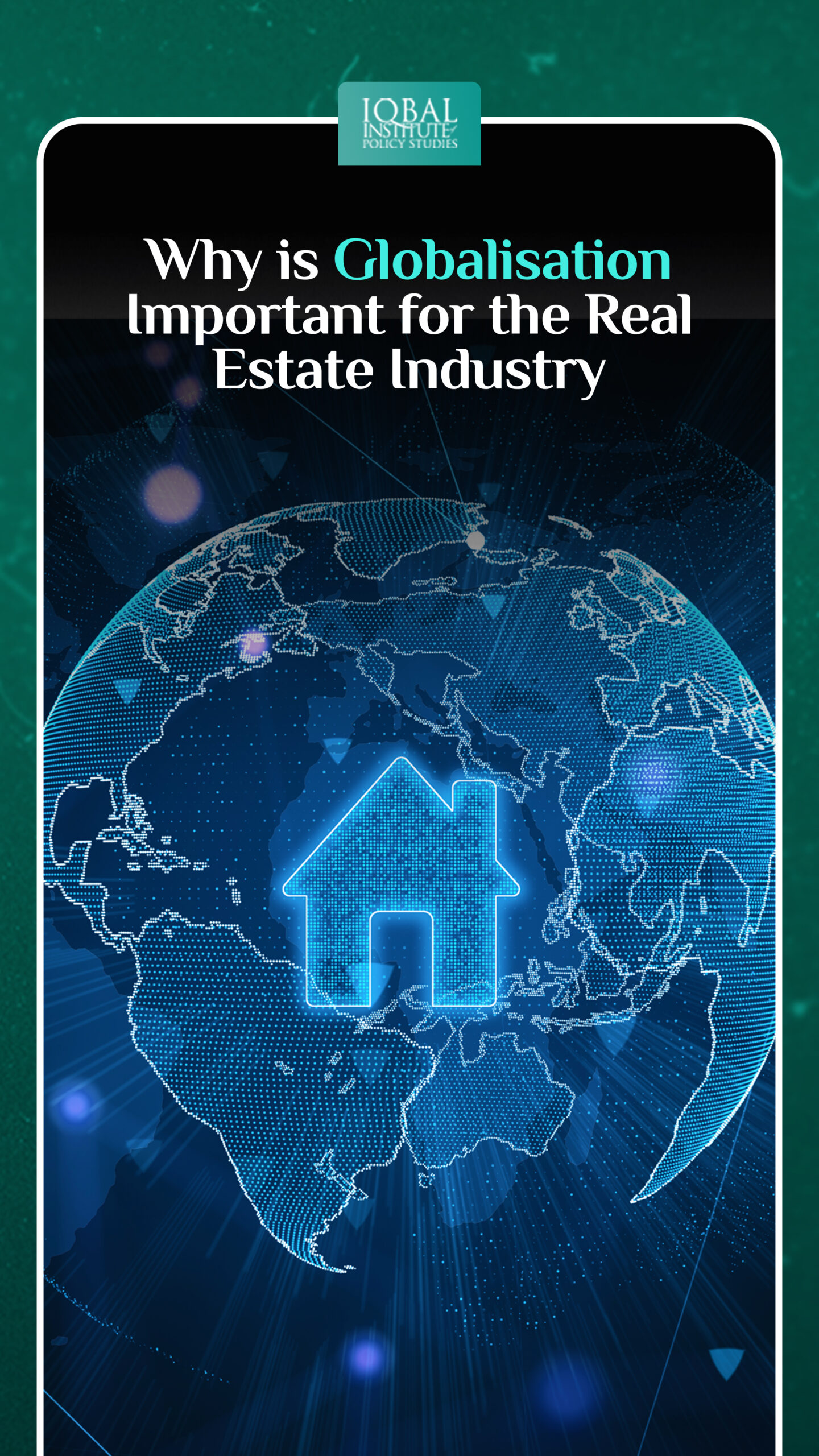Globalisation is a mainstream phenomenon in the modern world. It is causing the intermingling of people, societies, and economies, leading to global cultural, political, and economic integration. Industries which were once considered non-tradable are now interdependent due to shorter distances. The real estate industry, for example, has been renowned for being a non-marketable industry in the past due to its small localised market, spalled ownership, and illiquidity of real estate products. It was perceived as a local phenomenon and often misunderstood as a potentially feasible industry to attain global economic integration. However, today the real estate industry is not confined to a specific locality as it has been internationalised, making it a global asset. Moreover, the enhancement of international relations and their liberalisation has extended geographical reach, allowing the transformation of the real estate industry completely. Consumers of this industry are becoming global leading to the diversification and expansion of real estate companies and their services across borders. As a result, global competition is on the rise, which makes globalisation a boon for certain countries while a curse for others. Therefore, real estate companies are trying to kick it up a notch to gain from global markets and resources to keep up with the fast-paced globalization.
Significance of Globalization
An Open Market for Skills and Ideas
The rapid development of technology and advancement in communication means has resulted in an open market in international communities, which may attract the flow of information, new ideas, and skills for specific opportunities. Since the growth of the real estate sector is impossible without a skilled workforce, multinational real estate companies around the world are hiring skilled labourers from different countries. For example, India and China have sent their highly skilled labourers abroad (Buchholz, 2022). Moreover, globalisation has allowed the sharing of new ideas which can be adapted by any real estate sector around the world to keep up with changing trends and demands.
Growth of Investments
As the world’s population increases, the demand for residential, commercial, and industrial real estate is also increasing. Globalisation has resulted in the interconnectedness of financial systems, which adds to the convenience and ease of investors. New developmental projects, housing societies, and commercial areas with modern-day amenities attract foreign and local investments. For example, UAE has attracted more than Dh170 billion in investment in the real estate sector during the first seven months of 2022, and the investments are continuously growing (Shobeiry, 2022).
Trade of Goods and Services
International trade of goods and services has become a common practice worldwide. Therefore many real estate companies are expanding their businesses across borders to provide their goods and services. Intelligent marketing, diversification of portfolio, and strategy help the business flourish. For example, the real estate company Brookfield operates in more than 30 countries across 5 continents providing its expertise and services in the dynamic real estate markets around the world (Brookfield, 2022).
Property Listings
Globalisation has enabled the internationalisation of property listings on real estate companies’ websites. This allows prospective investors to browse through international real estate markets to find new and unique property listings. Real estate agents can build relationships with foreign investors that can expand their business and benefit that country’s economy as well.
Effective Communication
Globalisation and the internet have improved communication means by making them more effective and transparent. Real estate agents can easily communicate with their clients regardless of geographical distances. Interested clients can make deals and offer from the comforts of their homes, omitting the requirement of physical presence.
Online Presence
Globalization has enabled the expansion of the real estate industry from a local market to a digital platform that is within the reach of the global audience. Active real estate websites, mobile apps, and social media handles help these companies build a larger pool of clients. The option of multilingual real estate services and information available on websites help attract foreign customers leading to monetary benefits for the company and the country.
Globalization Significance in Real Estate of Pakistan
Pakistan’s real estate industry is flourishing rapidly attracting local and foreign investors. It is worth $300 to $400 billion and is considered a stronger division of Pakistan’s economy (Fraz, 2021). As a result, real estate companies are growing in the country, and so is the competition. For example, there is a rapid increase in the number of real estate companies. As many as 1,794 companies were incorporated in the last fiscal year, up 2.3 times from 773 companies registered in 2019-20 (Alam, 2021) This competition is further aggravated by globalisation related to technological adaption, market costs, quick production, and response, etc. As a result, real estate companies are undergoing digital transformation and adopting unique strategies to stand out and create a brand identity on both local and international forums. Moreover, globalization has allowed easy access and incorporation of new technologies in the real estate sector, which is helping Pakistan’s economy become greener and more productive. For example, eco-friendly and sustainable projects like Park View City Islamabad are attracting foreign investments and prospective clients from around the world (Qadir, 2021).
Furthermore, globalization has removed the trade barriers in construction materials, skilled labour force, and services which lead to the expansion of real estate businesses in the country and assure economic growth and stability. Pakistani real estate companies are now operating outside of Pakistan as well and bringing foreign investments into the country. For example, the real estate sector attracted $258 million in foreign investments in the first eight months of 2020-21 which is three times more than the $77m investment that was received in the entire 2019-20 (Alam, 2021). Also, international projects like CPEC are expected to revolutionize the real estate industry of Pakistan. It will not only attract foreign nationalities to the country but also increase the demand for housing units which will be fruitful for the economy. Additionally, the flow of information and knowledge has expanded the industrial mindset. As a result, the real estate industry is working responsibly to limit its carbon emissions to reduce the pace of climate change. Moreover, it is changing itself to adapt to the changing demands and trends set by the tech-savvy generation, such as the development of better infrastructure to improve service delivery. Globalization has allowed Pakistan to unleash its true potential and if the government carefully manages the resources and works towards the growth of its real estate sector, then it can revive and strengthen its ever-growing economy.
Conclusion
Globalization has changed the fate of the real estate industry completely by expanding it around the world. It has enabled the rapid technological and digital transformation of a sector which was notorious for slow adaptation to such transformations in the past. Real estate is no more a local asset. Therefore, this industry is emerging as a profit generator for countries around the world by increasing national income, creating new business opportunities, and increasing investments. In conclusion, globalisation is here to stay, and it will continue to impact the real estate industry in the future.
This article is written by Haneen Gul. Haneen is a Research Analyst at the Iqbal Institute of Policy Studies (IIPS).
References
Alam, K. (2021, September). DAWN. Retrieved from https://www.dawn.com/news/1645907
Brookfield. (2022). Retrieved from https://www.brookfield.com/
Buchholz, K. (2022, March 9). Statista. Retrieved from https://www.statista.com/chart/4015/the-top-countries-for-highly-educated-migrants/
Fraz, A. (2021). PIDE. Retrieved from https://pide.org.pk/research/real-estate-myths-in-pakistan-and-the-truth-behind-them/
Qadir, N. A. (2021, November 22). ReallPk. Retrieved from https://www.reall.pk/blog/eco-friendly-housing-society.html
Shobeiry, t. (2022, September 4). Khaleej Times. Retrieved from https://www.khaleejtimes.com/business/uae-real-estate-set-to-gain-further-momentum



Leave a Reply